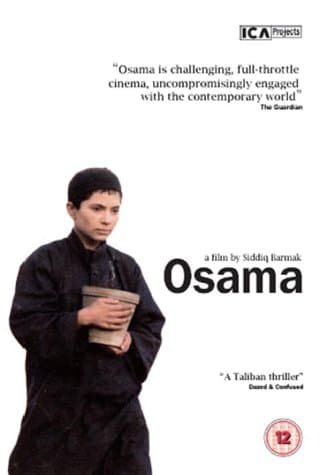
Osama (12)
Osama (12)
When you purchase through links on our site, we may earn an affiliate commission. Here's how it works.

User Reviews
The Winner Of The Golden Globe For Best Foreign-la
The winner of the Golden Globe for Best Foreign-Language Film, Osama is a heartbreaking depiction of life under the brutal Taliban regime in Afghanistan. Filmed over the course of year, this spare and artfully told drama from Siddiq Barmak has a gritty authenticity reminiscent of the Italian neo-realist films of Vittorio De Sica (The Bicycle Thief) and Roberto Rossellini (Open City). A cast of non-professionals, many of whom Barmak discovered on the street or in refugee camps, gives uniformly fine performances in a profoundly moving story that demonstrates the power of art to enlighten and entertain.
Shot on location in the bombed-out streets of Kabul, Osama puts a very human face on the Taliban's oppression of women. A young girl (the expressive Marina Golhahari) lives with her widowed mother (Zubaida Sahar) and grandmother in abject poverty. Forbidden to leave the house without a male escort, the girl's mother cuts her daughter's hair so she can pass as a boy. Although she's terrified of being exposed, the young girl goes to work for a kindly shopkeeper who fought alongside her late father against the Soviets. Unfortunately, the girl's delicate features and ignorance of religious custom arouse the suspicions of a Taliban leader. He forces her to attend a religious school/Taliban training camp, where she struggles to blend in with the other boys. A street urchin (Aref Herati) who knows her secret becomes her protector. To that end, he introduces her as Osama, but no matter how hard she tries to pass as male, she is ultimately betrayed by her own physiology.
While Osama is Barmak's first film, it feels like the work of an experienced director who knows that "less is more." Barmak doesn't linger over the horrors of life under the Taliban or milk the heroine's story for pathos. He tells the story simply and honestly, with refreshing economy (the film has a running time of only 82 minutes). Working with his gifted cinematographer Ebrahim Ghafuri, Barmak takes viewers deep into a world that most of us know only superficially from the nightly news. It's often difficult to watch-the sheer cruelty of the Taliban leaders is particularly disturbing-but Osama is a movie that needs to be seen.
Over the last few years, several Middle Eastern films have won international acclaim for depicting the repression of women under Islamic law. Iranian filmmaker Jafar Panahi courted controversy with The Circle (2000), a heartfelt episodic drama that strongly critiques Iranian society. The Day I Became A Woman (2001) is a beautifully filmed exploration of women's lives during adolescence, adulthood, and old age. And like Osama, Kandahar (2001) depicts life under the Taliban. In this intense film, which was named 2001's best film by Time magazine, an Afghan journalist who fled the country for Canada returns to find her suicidal sister. Of course, not every Middle Eastern film paints such a grim portrait of women's lives; Panahi's The White Balloon (1995) is a charming urban fable about a little girl's attempts to buy a goldfish in a Teheran market.
In one of the more glaring omissions from the list of Academy Award nominees, Osama was not nominated for Best Foreign-Language Film. Hopefully, this powerful film will find the audience it deserves.
Q&A
There are no questions yet. Be the first to ask a question.